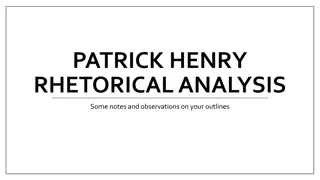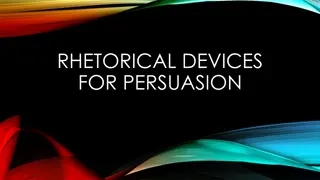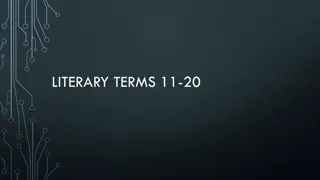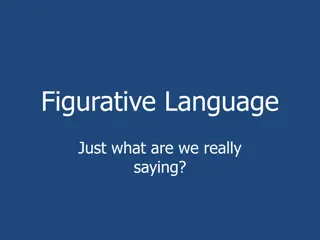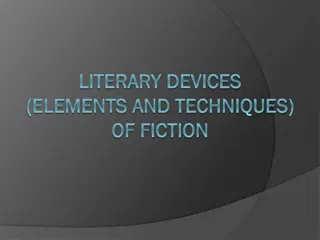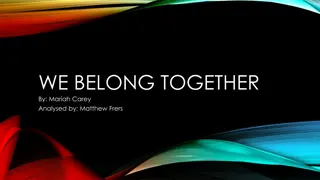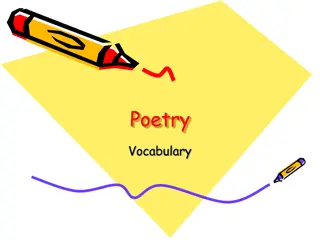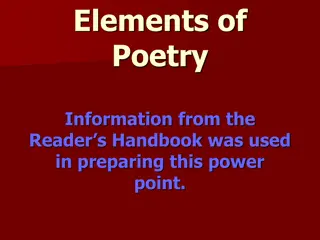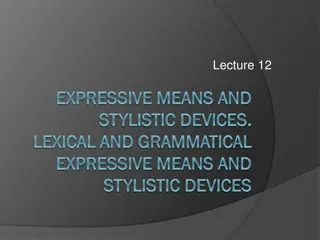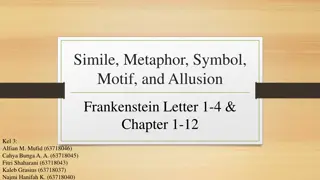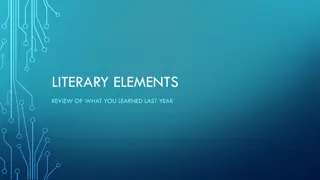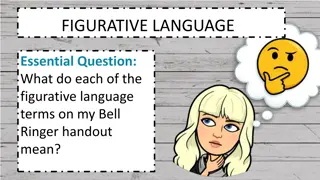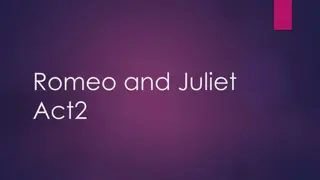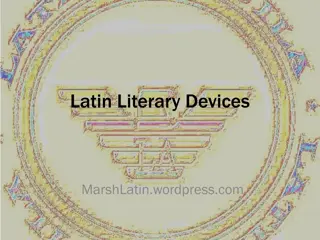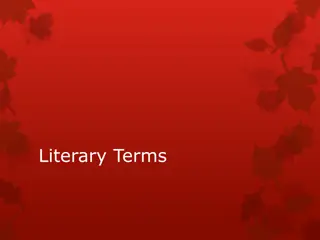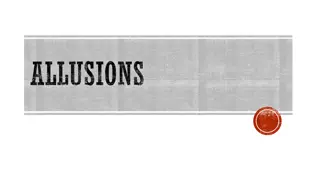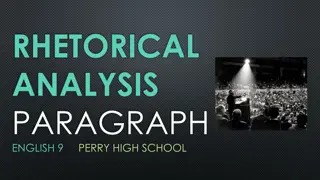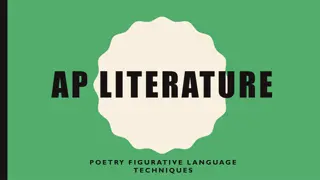Analyzing Patrick Henry's Rhetorical Strategies
Explore the effective use of rhetoric by Patrick Henry in his speech to ignite rebellion during the American Revolution. The analysis focuses on his use of allusion, metaphor, and powerful language to convince delegates to engage in war against England.
0 views • 8 slides
Mastering Rhetorical Devices for Persuasion
Understand the art of rhetoric and the power of persuasion through ethos, pathos, and logos. Explore how writers use varying techniques like formal word choice, emotional appeal, and allusion to sway audiences. Delve into the persuasive appeals of ethos, pathos, and logos as explained by Greek philo
0 views • 12 slides
Understanding Literary Devices: Allusion, Foil, Hyperbole, Idiom, Irony, Metaphor
Explore key literary terms including allusion, foil, hyperbole, idiom, irony, and metaphor. Learn how these devices enhance storytelling by creating depth, contrast, exaggeration, cultural nuances, and symbolic meaning within literature.
1 views • 14 slides
Exploring Figurative Language in Literature
Delve into the world of figurative language with an overview of alliteration, allusion, antithesis, cliché, colloquialism, connotation, denotation, and euphemism. Understand how these literary devices enhance writing through examples and explanations. Discover how poets use alliteration to create a
0 views • 24 slides
Explore Literary Devices and Elements of Fiction
Dive into the world of literary devices and elements of fiction, including setting, mood, plot, flashback, and foreshadowing. Understand how sensory details enhance writing and learn about techniques such as allusion, figurative language, and more. Discover the significance of these elements in shap
1 views • 28 slides
Analysis of Mariah Carey's "We Belong Together
Analyzing Mariah Carey's "We Belong Together" through examples of poetic devices such as imagery, figurative language, allusion, and mood. The song delves into themes of longing, heartbreak, and emotional turmoil, showcasing Mariah's vocal prowess and the deep emotions conveyed in the lyrics.
0 views • 12 slides
Poetry Vocabulary Explained: A Guide to Key Terms in Poetry
Explore the world of poetry with this comprehensive guide on key terms such as alliteration, allusion, ballad, metaphor, and more. Written definitions and examples provide a clear understanding of each concept, making it easier to appreciate and analyze poetic works.
0 views • 21 slides
Understanding Poetry: Elements and Examples
Poetry conveys ideas and feelings through carefully selected words and techniques. To interpret a poem, one must analyze elements like alliteration, allusion, hyperbole, figurative language, and more. Explore the beauty of free verse and delve into a Langston Hughes poem for a deeper understanding o
0 views • 30 slides
Understanding Lexical and Grammatical Expressive Means in Stylistic Devices
The lecture discusses various lexical and grammatical expressive means in stylistic devices, such as metaphor, personification, allusion, metonymy, synecdoche, irony, epithet, and oxymoron. These tools allow for creative and vivid expressions in language by playing with different meanings and associ
0 views • 22 slides
Literary Devices in Frankenstein: Analysing Simile, Metaphor, Symbol, Motif, and Allusion
Explore the intricate use of simile, metaphor, symbol, motif, and allusion in Frankenstein through excerpts from Letter 1-4 and Chapters 1-12. Dive into the vivid comparisons, symbolic representations, and layered meanings embedded in Mary Shelley's classic novel.
0 views • 11 slides
Comprehensive Literary Elements Review
In this literary elements review, we delve into various aspects such as simile, metaphor, rhyme, repetition, alliteration, assonance, allusion, hyperbole, and personification. Understand the definitions of each element with examples provided, enhancing your knowledge of literary devices.
0 views • 20 slides
Understanding Figurative Language in English Literature
Explore the meaning and examples of various figurative language terms such as simile, metaphor, personification, onomatopoeia, oxymoron, idiom, hyperbole, allusion, and alliteration. Enhance your understanding of how these literary devices are used to add depth and imagery in writing.
0 views • 14 slides
Analysis of Literary Devices in Romeo and Juliet Act 2
In Act 2 of Romeo and Juliet, the characters use various literary devices such as allusion, dramatic irony, hyperbole, and foreshadowing. Mercutio mistakenly believes Romeo is still in love with Rosaline, showcasing dramatic irony. Additionally, Friar Lawrence's words foreshadow the danger in Romeo
0 views • 10 slides
Exploring Latin Literary Devices Through Examples
Uncover the beauty of Latin literary devices through vivid examples such as alliteration, anaphora, allusion, and more. Dive into the world of Latin literature and enhance your understanding of these powerful techniques.
0 views • 31 slides
Literary Terms Explained: From Alliteration to Conflict
Explore essential literary terms such as alliteration, allusion, analogy, antagonist, assonance, character, characterization, climax, and conflict. Learn about these terms and their examples to enhance your understanding of literature.
0 views • 40 slides
Understanding Allusions in Literature and Film
Allusions in literature and film refer to references made to well-known people, places, events, or works of art from outside the text or movie. Connecting these references helps readers/viewers gain a deeper understanding of the content by relating it to something familiar. The purpose of using allu
0 views • 7 slides
Analyzing Rhetorical Devices in King and Wiesel Speeches
Explore the rhetorical devices used by Martin Luther King Jr. and Elie Wiesel in their speeches through the lens of ethos, pathos, logos, repetition, parallelism, metaphor, allusion, imagery, diction, and rhetorical questions. Understand how these devices strengthen the authors' positions and argume
0 views • 10 slides
Understanding Figurative Language Techniques in AP Literature Poetry
Exploring the purpose of figurative language in poetry adds depth and emotion to the text. Learn about key techniques like symbolism, metaphor, simile, personification, and allusion. Discover advanced concepts such as metonymy, synecdoche, allusion, synesthesia, hyperbole, and more. Delve into the p
0 views • 6 slides
